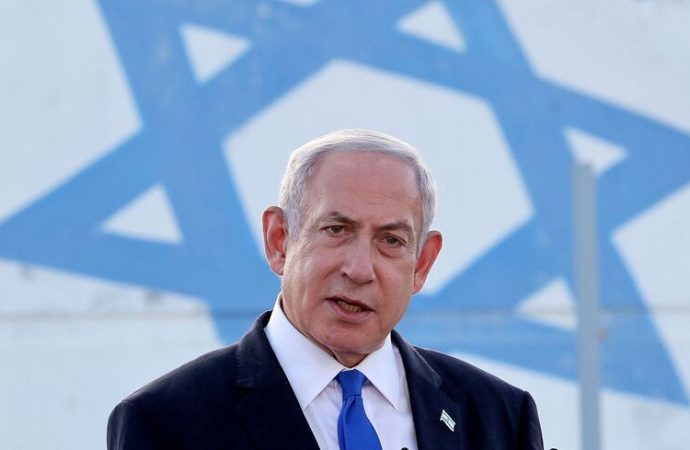On June 17, 2024, Israeli Prime Minister Benjamin Netanyahu announced the dissolution of the country’s war cabinet following the resignation of its centrist members. This unexpected move has sparked widespread debate and concern within Israel and among international observers. The decision comes at a critical time, with implications for Israel’s security, political stability, and future
On June 17, 2024, Israeli Prime Minister Benjamin Netanyahu announced the dissolution of the country’s war cabinet following the resignation of its centrist members. This unexpected move has sparked widespread debate and concern within Israel and among international observers. The decision comes at a critical time, with implications for Israel’s security, political stability, and future policymaking.
Background of the War Cabinet

This image is taken from google,com
The war cabinet was established to address Israel’s escalating security challenges, particularly the ongoing conflict with neighboring territories and rising tensions in the region. Composed of members from various political factions, the cabinet was designed to ensure a unified and comprehensive approach to national security.
Reasons for the Dissolution
The resignation of the centrist members was primarily driven by disagreements over military strategies and political policies. These members felt increasingly sidelined by Netanyahu’s hardline stance and felt their input was being ignored. The final straw reportedly involved a major military operation that was executed without their consultation, leading to their abrupt departure.
Political Implications
The dissolution of the war cabinet highlights the deepening political divisions within Israel. Netanyahu’s move to dissolve the cabinet rather than seek compromise has been interpreted as a sign of his unwillingness to engage with moderate voices. This decision is likely to have far-reaching consequences for his political standing and the country’s governance.
- Loss of Moderate Voices: With the departure of centrist members, the war cabinet now lacks a balanced perspective, potentially leading to more extreme policy decisions.
- Public Trust Erosion: The public’s trust in the government’s ability to handle security matters effectively might diminish, particularly among those who supported a more centrist approach.
- Political Polarization: This event may deepen the political polarization in Israel, further dividing the right and left factions and complicating future coalition-building efforts.
Security Ramifications
The dissolution of the war cabinet during a period of high security tension is concerning. The centrist members often played a crucial role in moderating more aggressive military strategies, advocating for diplomatic solutions alongside military action. Their absence could lead to:
- Increased Military Actions: Without the moderating influence of the centrists, there might be an increase in aggressive military operations, potentially escalating conflicts.
- Diplomatic Fallout: More aggressive policies could strain Israel’s relationships with its allies, particularly those advocating for peaceful resolutions and diplomatic engagements.
- Internal Security Concerns: The internal discord within the government could embolden adversaries, perceiving Israel as weakened and divided.
International Reactions
The international community has expressed mixed reactions to Netanyahu’s decision. Some allies, particularly those supportive of Netanyahu’s hardline stance, have backed the move, seeing it as a necessary step to streamline decision-making. However, many nations, especially in Europe and some factions within the United States, have voiced concerns over the implications for regional stability and peace prospects.
- Support from Hardline Allies: Countries that align with Netanyahu’s security policies have expressed support, emphasizing the need for a decisive and unified leadership.
- Concerns from Moderates: Nations favoring a balanced approach have criticized the move, fearing it might lead to increased regional instability and hinder peace efforts.
- Neutral Observers: Some countries have adopted a wait-and-see approach, closely monitoring the situation to gauge the long-term impacts.
Future Prospects
The future of Israel’s security and political landscape remains uncertain. Netanyahu’s decision to dissolve the war cabinet could either lead to a more streamlined and decisive government or exacerbate existing divisions and lead to further instability. Key factors to watch include:
- Formation of a New Cabinet: Whether Netanyahu can form a new cabinet that includes a broader range of perspectives will be crucial.
- Public Response: The reaction of the Israeli public, including potential protests and shifts in public opinion, will significantly impact the political landscape.
- International Diplomacy: How Israel navigates its diplomatic relationships in the wake of this decision will also be pivotal.
Analysis Table: Impacts of War Cabinet Dissolution
| Aspect | Impact | Explanation |
|---|---|---|
| Political Stability | Decreased | Deepened political divisions and potential difficulty in coalition-building. |
| Security Policies | More Aggressive | Likely shift towards more aggressive military actions without centrist moderating influence. |
| Public Trust | Eroded | Public concern over government’s ability to handle security matters effectively. |
| International Relations | Strained | Potential diplomatic fallout with nations advocating for balanced and peaceful resolutions. |
| Government Functionality | Disrupted | Challenges in forming a new, effective cabinet and ensuring cohesive policymaking. |
Comparative Table: Before and After War Cabinet Dissolution
| Aspect | Before Dissolution | After Dissolution |
|---|---|---|
| Government Composition | Inclusive of various political factions | Dominated by hardline perspectives, lacking centrist voices. |
| Military Strategy | Balanced with diplomatic considerations | More inclined towards aggressive military actions. |
| Decision-Making Process | Collaborative | Centralized around Netanyahu, with less input from moderate factions. |
| Public Sentiment | Mixed but relatively stable | Increased polarization and potential for public unrest. |
| International Standing | Generally stable | Potentially weakened due to perceived internal instability and aggressive policies. |
Conclusion
The dissolution of Israel’s war cabinet marks a significant turning point in the country’s political and security landscape. Prime Minister Netanyahu’s decision, prompted by the resignation of centrist members, underscores the deep divisions within Israeli politics and raises critical questions about the future direction of the country’s policies. As Israel navigates this turbulent period, the balance between security needs and political cohesion will be crucial in determining its path forward. International observers and Israeli citizens alike will be watching closely to see how this decision impacts both the immediate security situation and the long-term political stability of the nation.
















